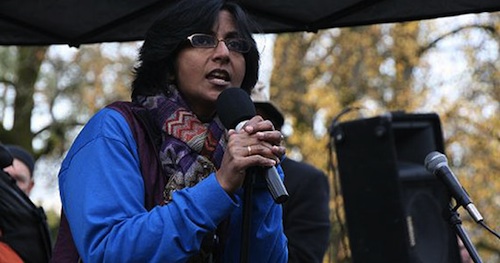Kshama Sawant, a college professor and Occupy movement activist, is now a City Council member in Seattle. She’s definitely a rare socialist to hold American elected office (“Abama’s a socialist!!” — right wing talk radio), and one of the few Occupy movement members to win a popular election. She was actually trailing on Election Night by eight percentage points, but Washington has vote-by-mail options, and when those were counted, she defeated Richard Conlin, who had been incumbent in the position. He conceded on Friday. On Monday, Sawant gave a speech declaring that “It is time, high time, that we workers opt for a mass political alternative to the two big business parties!”
I don’t think I’m a socialist — I’d classify myself as a Democrat or an independent, honestly — but I’m all for this attitude at the broadest level (although maybe not at the functional level). I do believe the two party system is kind of BS at this point; I think it’s driven home more and more over the years that the goals are power, influence, money and your next election — and not actually the happiness, health, opportunity for advancement, and prosperity of the citizens you represent. Now, I’m not saying socialism assures those things either; in reality, it probably doesn’t. What I am saying is that an alternative to something that isn’t working — and the two-party system legitimately isn’t really working right now — has to be a good thing to at least explore, even if it ends in a dead end. Hopefully the ‘socialist’ tag won’t kill this whole concept.
Purportedly, she’s the first socialist to ever be elected into office in the U.S.; she gave an interview to Salon after her win and discussed the idea of capitalism eventually eroding. It seems like she’s not a total zealot or anything from her response:
It would be difficult for me to lay out a blueprint of that. But … we can think about what it will require …
Capitalism is a system where it’s extremely productive, and productivity rates are at an all-time high, but the gains of the productivity are delivered almost exclusively to a very tiny elite at the top …
Boeing has an enormous factory, [as well as] all the auto factories that are lying defunct right now in the U.S. — they all have enormous capacity for production. And there’s any number of workers with the skills, and people who have the potential of learning those skills. And instead we have a situation where, because we don’t have a say in the production, either the machines are lying idle, or the machines are being used to produce destructive machines like drones.
So what we need to do is to take the machines and the factories into democratic, say, democratic ownership — and the workers can contribute rail cars or buses, something like that, something that is beneficial to society. And that’s something that creates jobs — it will create living wage jobs …
That’s the kind of system that we need, where the decisions on what to do with resources, and what to produce, how much of it to produce, that is made in accordance with democratic principles, and in accordance with what human society needs, not because the Wal-Mart CEO needs to make 2 percentage points more profits this quarter.
Her win has been dubbed ‘a political earthquake’ in Seattle.
The seemingly improbable win says a few different things, although it should be noted that Seattle is a very specific, very blue pocket of a very specific area of the country, so extrapolating nationally would likely be a major mistake. Her war chest was only about $120K, which is small even by mid-to-large-size-city City Council race standards; she ran a good campaign that made use of the media attention for running as a socialist, and her message likely resonated with disenfranchised middle-middle-class (as opposed to upper-middle-class) voters.
Yesterday, she told Boeing workers that if jobs were moved out of the state, one idea would be to take over the factories and shut down the profit engine. That might not play as well in America as some of her more umbrella-level ideas. Basically, Seattle — like much of the rest of the country — is fed up with growing inequality; this win is a symbol of that. We shouldn’t think Sawant is headed for the Mayor’s Chair or Governor’s mansion in Washington; Jay Inslee, the current Governor, is a fairly liberal Democrat but still ID’ed as conservative 12 percent of the time he was in the House. That’s a bit centrist compared to a socialist stance.
You can learn a bit more about Sawant in her AMA on Reddit, as well as on this thread. Sawant did run, and lose, last year to Frank Chopp. Her run this year was different, and a bit more focused. One of her textbook campaign run moves was about raising the minimum wage, which I feel you have to argue against to pass the first semester of AP Economics, but in 2014, it might not be the worst idea in history:
Standout for Kshama Sawant for City Council! Honk for raising the minimum wage! Or at least retweet! #fightfor15 pic.twitter.com/2lDbzlAteP
— Kshama Solidarity Campaign (@Kshama_SC) July 21, 2013
I like this concept, but again, at the broadest possible level. It’s a small dent (almost a dent no one notices) in the BMW of our current two-party political landscape, but the dent still means something, even if it just means we should consider taking something in to get fixed. Her language is too extreme to resonate at any kind of deep level, especially when she claims “capitalists are criminals” at a Travyon Martin rally…
… but our current system isn’t doing a ton right, so why not let a socialist on a large City Council and see if anything changes?

She’s Not Even The First Socialist Elected In Seattle. Rookie.